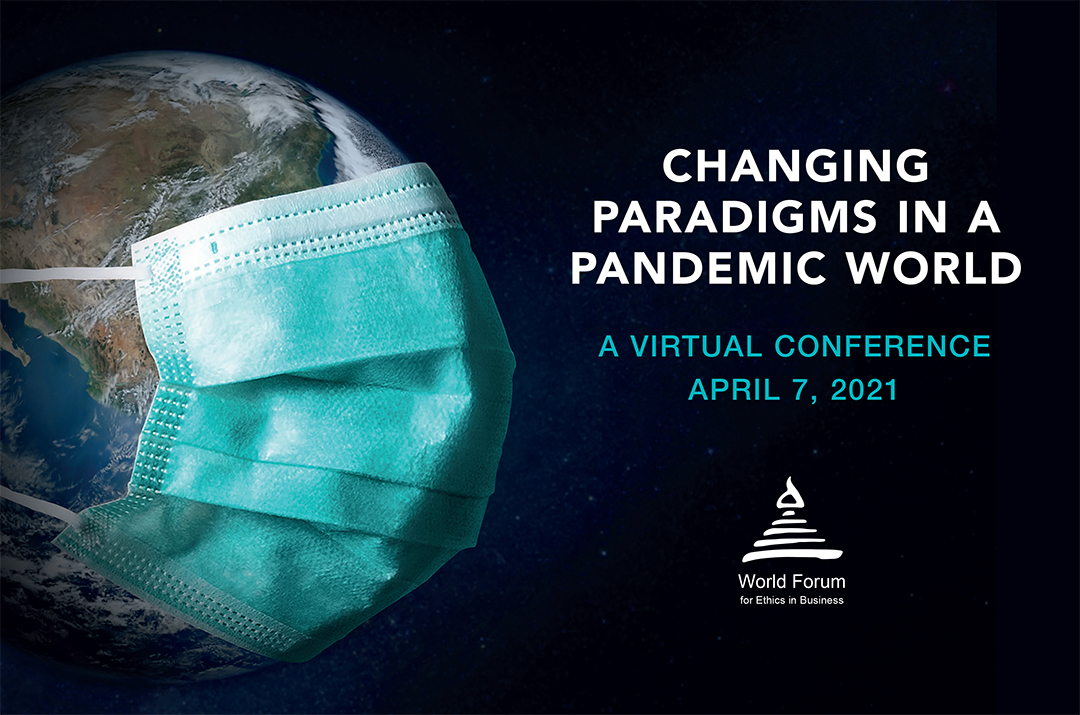
“Changing Paradigms in a Pandemic World: How to regain trust? – Health, Happiness & Ethics” is the topic of the conference that is going to be held on 7th April 2021 from 1 pm – 7 pm CEST.
Since the outbreak of Covid-19, the pandemic has drastically changed the way we live, work and interact with each other. Around the world, the pandemic and it measures to contain the virus have caused seismic changes to our daily habits and routines and brought new challenges to both individuals and societies that impact health behavior in many ways.
Isolation, lockdowns, economic turmoil, loss of loved ones and a feeling of powerlessness have determined the lives of citizens globally. Levels of stress and anxiety have risen substantially. Substance and alcohol abuse have reportedly risen, while self-harm and suicide rates among at risk individuals are also on a rise. The United Nations officially warn of a sharp rise in mental health problems as a result of the COVID-19 pandemic.
Not only has the pandemic impacted citizen’s mental health in an unprecedented way. Worldwide, extensive social distancing policies are or were put into place, restricting people’s daily activities and movement. New studies show that the COVID-19 stay-at-home orders resulted in a dramatic increase in unhealthy lifestyle changes such as significant increases in sedentary leisure behaviors, declines in physical activity, increase in smoking and alcohol use, bad nutrition choices and weight gain, especially in people with obesity, all in turn risk factors for the Coronavirus. Yet, physical health in turn has a big impact on how we are feeling emotionally and mentally. At times like these it can be easy to fall into unhealthy patterns of behavior which create a vicious circle for overall health and wellbeing.
Never before has the importance of the individual’s health, equal access to health care, health promotion and prevention been in such forefront of the discussion.
The role of governments, businesses, academics, media and civil societies has become more important than ever to create environments and tools that promote holistic health and wellbeing and address the physical and mental health consequences of the pandemic.
However, in a time where the entire world is threatened by the Covid-19 pandemic and only collectively can solve the crisis, we are witnessing governments, businesses and research experts competing with each other, either fighting about contrary or withholding information, putting individual interests first, and taking individual actions rather than cooperating, exchanging knowledge and sharing best practices.
The procurement and distribution of vaccines has become an inequal and egoistic ‘Me-First’ process, seeming to forget the interdependence and the devastating consequences it will have both on a national and global level.
Among the general public, mistrust, tension and hate speech have increased with the lack of clear and transparent information available, leaving citizens feel uninformed, irritated and left alone.
Have we as a global community failed to address the crisis collectively? What is the ethics that needs to underpin all activities to contain the virus and address its consequences? And how does a value-based leadership that leaves citizens informed, equally treated and puts the individual’s wellbeing at the very core of all activities need to look like?
On the occasion of World Health Day, the World Forum for Ethics in Business invites leading experts to put into perspective the current ethical implications and consequences of the pandemic on the individual‘s health, showcase best practices, and will deliberate on an urgent roadmap required to scale-up ethics and values in physical and mental health efforts around the world. The conference will also examine tools and best practices to support citizens’ mental health.
In dedicated keynote panel discussion and theme-based breakout sessions, this global online conference will discuss central topics such as:
– The threat of vaccine nationalism
– Aggression and depression – Mental health in the spotlight and how to address it
– The ethical and moral leadership crisis revealed by the Covid-19 pandemic
– The role of media, governments, academics, and civil society in providing transparent and accurate information
– A holistic approach to health and wellbeing
– Finding back to compassion
To join this conference and receive all updates kindly register here!
Contact:
Press(at)wfeb.org | office(at)wfeb.org
